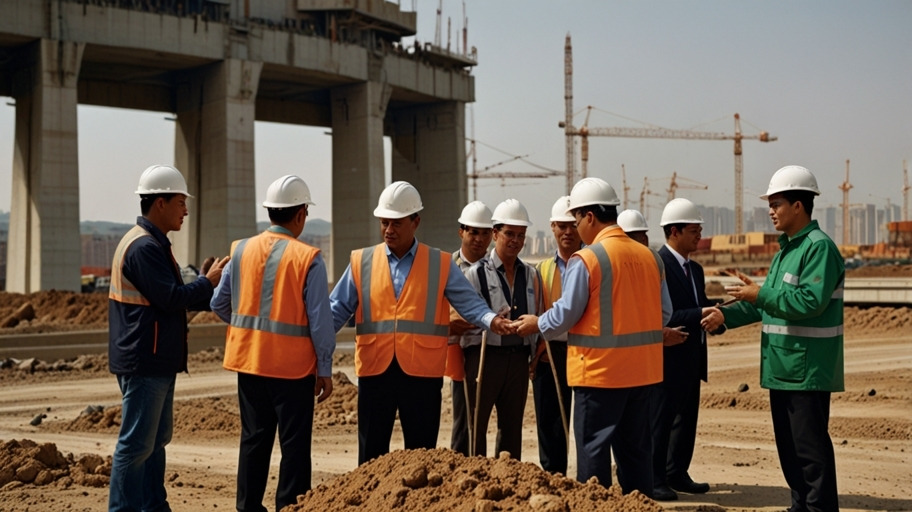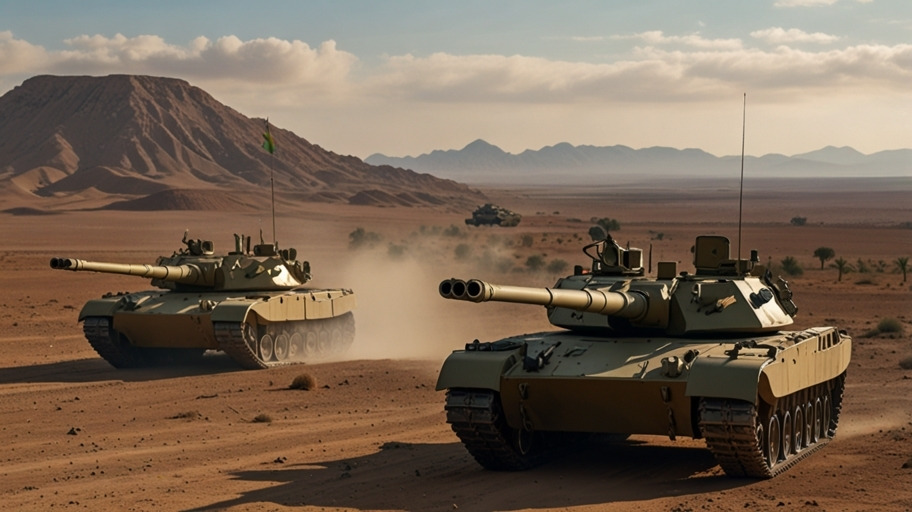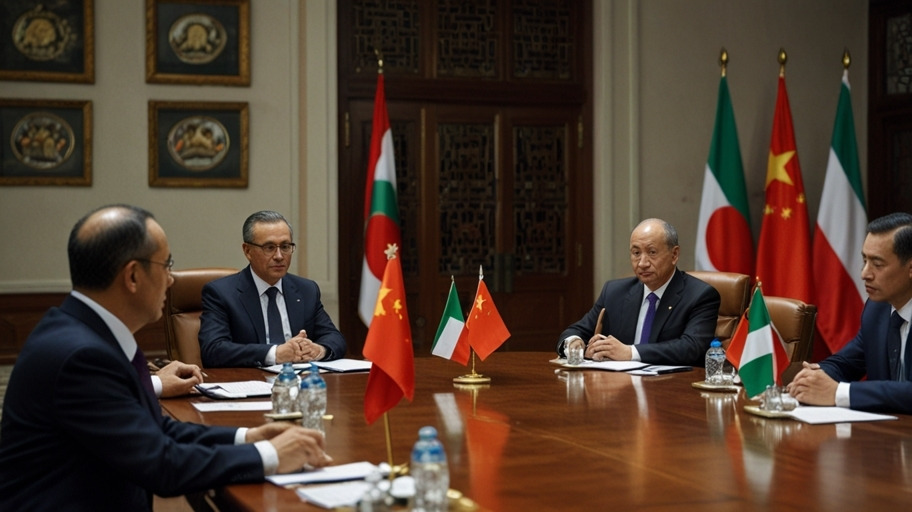Algeria's Foreign Policy: Strengthening Ties with China and Russia
Introduction
Algeria, a North African nation rich in oil and gas resources, has long pursued a foreign policy of non-alignment, emphasizing sovereignty and independence from superpower influence. Since gaining independence from French colonial rule in 1962, Algeria's foreign policy has been shaped by its revolutionary past, domestic priorities, and a desire to play a prominent role in regional and international affairs. Over the past two decades, Algeria's foreign policy has increasingly been characterized by efforts to strengthen ties with major global powers, particularly China and Russia. This move Algeria's attempt to diversify its diplomatic, economic, and military partnerships reflects while maintaining a balance between different global blocs. The growing relationship between Algeria, China, and Russia has implications for the geopolitics of the Middle East, North Africa, and the broader international system .
This article explores the drivers behind Algeria's foreign policy shift towards China and Russia, the nature of the relationships, and the strategic implications of these partnerships for Algeria and its position in global affairs.
Historical Context: Algeria's Foreign Policy Trajectory
Algeria's foreign policy has evolved from a focus on anti-colonialism and non-alignment to one of strategic pragmatism, adapting to changes in the international order. After gaining independence in 1962 following a brutal war of liberation against French colonialism, Algeria positioned itself as a leader of the Global South. During the Cold War, it maintained a policy of non-alignment but leaned towards the Soviet Union due to shared socialist ideals and the need for military assistance. Algeria also played an active role in the Non-Aligned Movement ( NAM) and supported liberation movements across Africa and the Arab world.
After the Cold War and the collapse of the Soviet Union, Algeria had to adjust its foreign policy in a unipolar world dominated by the United States. The 1990s, however, were a tumultuous decade for Algeria due to a bloody civil war between the government and Islamist insurgents. During this period, Algeria's foreign relations took a backseat as the country focused on internal stability. By the 2000s, Algeria began to re-engage with the international community, particularly through its energy exports, and started to diversify its foreign partnerships, especially as China and Russia emerged as counterweights to Western hegemony.

Algeria and China: A Growing Strategic Partnership
Economic Cooperation
China has become an increasingly important partner for Algeria, particularly in terms of economic relations. Algeria is Africa's largest natural gas producer and the third-largest oil producer on the continent, making it an attractive partner for energy-hungry China. Over the past two decades, Chinese companies have made significant inroads into Algeria's infrastructure sector, winning contracts for large-scale projects such as highways, railways, ports, and housing developments. The Chinese government, through its Belt and Road Initiative (BRI), has positioned itself as a key player in Algeria's economic modernization efforts.
One of the most notable examples of China's involvement in Algeria is the East-West Highway project, a $13 billion infrastructure initiative that spans over 1,200 kilometers and connects Algeria's borders with Morocco and Tunisia. Chinese companies have also been involved in building hospitals, universities, and other critical infrastructure, contributing to Algeria's development goals.
In return, Algeria provides China with access to its vast energy resources. Although Algeria is not the largest supplier of oil and gas to China, it is an important player in the broader context of China's strategy to diversify its energy imports. As a member of the Organization of the Petroleum Exporting Countries (OPEC) and a key player in the global natural gas market, Algeria's energy resources are a valuable asset in its relationship with China.
Political and Diplomatic Alignment
Beyond economic cooperation, Algeria and China have also found common ground on political and diplomatic issues. Both countries share a commitment to the principle of non-interference in the internal affairs of sovereign states, a stance that has become a cornerstone of their bilateral relations. This resonates strongly with Algeria principle, which, due to its colonial history, remains sensitive to any form of foreign intervention in its domestic affairs.
China and Algeria have also aligned on issues such as counter-terrorism and regional security. Algeria has faced the threat of terrorism, particularly from Islamist extremist groups operating in the Sahel region, and has sought international partnerships to enhance its counter-terrorism capabilities. , concerned about the spread of extremism in its western Xinjiang region, sees Algeria as an important partner in its broader efforts to combat terrorism and maintain stability in North Africa and the Sahel.
Moreover, both countries support a multipolar world order that challenges Western dominance, particularly that of the United States. Algeria's foreign policy, which emphasizes independence and non-alignment, finds a natural partner in China's growing influence in global institutions such as the United Nations and its advocacy for reforming the global governance system.

Algeria and Russia: A Longstanding Relationship Reinforced
Military Cooperation
Russia has been one of Algeria's primary military partners since the days of the Soviet Union. This relationship has remained strong over the years, with Algeria consistently being one of the largest purchasers of Russian military equipment. Algeria's military, the People's National Army, is heavily reliant on Russian weapons, including tanks, fighter jets, helicopters, and air defense systems.
In recent years, Algeria has continued to deepen its military cooperation with Russia. Between 2010 and 2020, Algeria was one of the top importers of Russian arms, and this trend has continued as Algeria seeks to modernize its military capabilities. In 2021, Algeria signed a contract to purchase advanced Russian fighter jets, including the Su-35, further solidifying its position as one of Russia's key defense clients.
Joint military exercises and training have also been a feature of the Algeria-Russia relationship. Both countries have held joint naval exercises in the Mediterranean Sea, and Algerian military personnel regularly receive training in Russia. This military cooperation is driven by Algeria's desire to maintain a robust defense capability in a region marked by instability, particularly in the Sahel and Libya, where extremist groups and political turmoil pose significant threats to national security.
Energy Collaboration
Algeria and Russia also share common interests in the global energy market. As two of the world's largest producers of natural gas, both countries play significant roles in shaping the dynamics of the global energy market. Algeria is a member of OPEC, while Russia is one of the world's leading non-OPEC oil producers. The two countries have cooperated in efforts to stabilize global oil prices, particularly through coordination within OPEC+ agreements.
In 2022, as the global energy market faced disruptions due to the Russia-Ukraine conflict, Algeria's importance as a gas supplier to Europe increased. European countries, seeking to reduce their dependence on Russian gas, turned to Algeria as an alternative source. This dynamic has placed Algeria in a delicate position, balancing its energy exports to Europe with its longstanding partnership with Russia.
Diplomatic Alignment and Global Affairs
Diplomatically, Algeria and Russia have found common cause in their opposition to Western interventionism and their support for a multipolar world order. Both countries share a commitment to the principle of state sovereignty and non-interference, and they have consistently voiced opposition to NATO interventions in the Middle East and North Africa.
Algeria's diplomatic alignment with Russia is also evident in its stance on conflicts in the Middle East, such as the Syrian civil war, where both Algeria and Russia have supported the government of Bashar al-Assad. This shared approach to regional conflicts reflects a broader convergence of interests, as both countries seek to counterbalance Western influence in the region.

Strategic Implications for Algeria
Diversification of Foreign Partnerships
Algeria's growing relationships with China and Russia reflect its strategic objective of diversifying its foreign partnerships to reduce dependence on any single global power. While Algeria maintains strong ties with Western countries, particularly France and the United States, its partnerships with China and Russia provide it with alternative sources of military, economic, and diplomatic support. This diversification allows Algeria to navigate the complexities of the international system more effectively and to assert its independence in foreign policy decision-making.
Balancing Act Between Global Powers
Algeria's foreign policy strategy requires a delicate balancing act, particularly in the context of rising tensions between global powers. As China and Russia challenge the Western-dominated international order, Algeria must navigate its relationships with all major powers to protect its national interests. The ongoing rivalry between the United States and China, as well as the strained relations between Russia and Europe, present Algeria with both opportunities and challenges.
For example, Algeria's energy exports to Europe have become increasingly important as European countries seek to diversify away from Russian gas. At the same time, Algeria values its military and diplomatic partnership with Russia and is unlikely to jeopardize this relationship., Algeria benefits from Chinese investment in infrastructure and economic development but must also maintain good relations with Western countries that remain key trading partners.
Influence in Regional and International Affairs
By strengthening ties with China and Russia, Algeria positions itself as a more influential player in regional and international affairs. Its partnerships with these two major powers enhance its role as a regional security actor in North Africa and the Sahel, where terrorism and instability remain pressing concerns. Algeria's military cooperation with Russia and its growing counter-terrorism collaboration with China bolstered its capacity to address security challenges in its neighborhood.
On the international stage, Algeria's alignment with China and Russia on issues such as state sovereignty and non-interference increases its influence within global institutions, particularly the United Nations. As both China and Russia seek to reform global governance structures to reflect a more multipolar world , Algeria's partnership with these powers strengthens its position as a vocal advocate for the Global South and the Non-Aligned Movement.